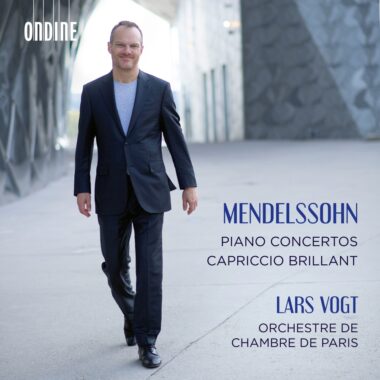L’énorme retentissement de la disparition de Lars Vogt dans (et par) le monde de la musique
Le décès il y a trois jours de Lars Vogt connaît un énorme retentissement _ ô combien mérité ! _ dans le monde de la musique,
par exemple en Amérique…
…
…
Ainsi, sur le site de ClassicsToday.com,
ce bel article en hommage de Jens F. Laurson, « a re-post in memory of Lars Vogt, who passed away on September 5« ,
faisant l’éloge du CD, sous le titre de « A Splendid Contemporary B-flat Major Brahms Concerto From Lars Vogt« …
…
…
…
…
Mais aussi, ce jour,
ce bel article-ci intitulé « Un Mendelssohn céleste par Lars Vogt« sous la plume de Maciej Chiżyński,
faisant écho à mes articles particulièrement enthousiastes du 11 mars : « D’enthousiasmants Concertos pour piano (Op. 25 et Op. 40) de Felix Mendelssohn par un Lars Vogt, en état de grâce, au piano et à la baguette : un sublime à jamais juvénile CD ! » et du 5 avril derniers :« A propos des deux Concertos pour Piano et Orchestre, Op. 25 et Op. 40, de Felix Mendelssohn : des « Concertos d’opéras » en une interprétation désormais indispensable !« … :
…
…
Lars Vogt nous a quittés il y a trois jours. Il aurait soufflé aujourd’hui _ 8 septembre 2022 _ ses cinquante-deux bougies. Dans ce dernier disque, il se met au piano pour aborder les Concertos pour piano n° 1 et n° 2 de Felix Mendelssohn, dirigeant depuis l’instrument.
…
Dès les premiers accords du Concerto n° 1, Lars Vogt nous entraîne dans l’atmosphère solennelle de cette partition, alliant brio, panache, fougue et légèreté _ tout à la fois, en le plus splendide naturel… Empreint de verve _ oui _ dans les passages soumis à un tempo rapide, il n’en est pas moins raffiné _ oui _ dans les thèmes lyriques, respectant intelligemment les proportions entre la virtuosité et la poésie _ parfaitement, comme Mendelssohn le nécessite et le mérite. La phalange qu’il dirige ne lui cède pas le pas, déployant des couleurs chatoyantes et joyeuses _ oui ! Felix Mendelssohn est d’abord un musicien de la joie _, notamment chez les vents. Porté par une énergie solaire _ voilà : lumineuse autant que chaleureuse _, l’Orchestre de chambre de Paris se montre à la fois précis, plein d’amplitude expressive ainsi qu’attentif aux nuances que lui entonne le piano _ voilà.
…
…
Dans le deuxième Concerto, Lars Vogt subjugue tant par la finesse que par la souplesse agogique _ oui _, inculquant à cette page un souffle de profondeur _ mais oui. On se penchera sur la sonorité satinée des cordes, tout autant que sur la consistance des cuivres et la délicatesse des bois, adoucie par des demi-teintes pastel. Avec sa transparence des plans sonores, une articulation nette du piano et de l’accompagnement, Lars Vogt signe une référence moderne _ oui _ menée dans l’esprit d’une interprétation se voulant historiquement informée.
…
…
En bis, Lars Vogt propose le Capriccio brillant op. 22, une composition datant de 1832, élaborée entre le Premier et le Deuxième concerto. Il nous en livre ici une lecture lumineuse, s’imprégnant de couleurs vives et gaies, mais aussi riche de contrastes d’ambiances, vibrante et pathétique dans les moments de tension dramatique.
…
…
Voici un disque-testament _ rétrospectivement… _ poignant, une preuve éloquente que Lars Vogt était au sommet de ses possibilités artistiques, avec un énorme potentiel _ oui _ et une approche intelligente _ fine et exaltante _ de l’interprétation.
Felix Mendelssohn (1809-1847) :
…
Concertos pour piano n° 1 et n° 2 ;
Capriccio brillant op. 22.
…
Lars Vogt, piano et direction ; Orchestre de chambre de Paris.
…
1 CD Ondine.
…
Enregistré du 2 au 5 novembre 2021 à la Philharmonie de Paris.
…
Textes de présentation en anglais, allemand et français.
…
Durée : 51′ 34
…
…
En forme d’adieu à la personne de Lars Vogt,
mais aussi un au-revoir au musicien qu’il demeure pour nous par le disque…
…
…
Ce jeudi 8 septembre 2022, Titus Curiosus – Francis Lippa


